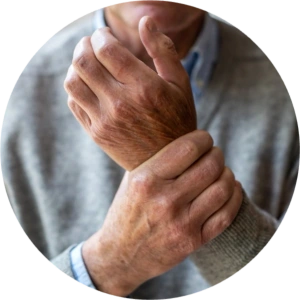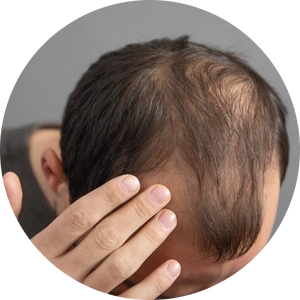Losing hair is a common concern for most men. Whether you see it coming or not, it can seem like a pretty inevitable fate to experience some hair loss if you’re a man.
Nearly 40% of guys in their 30s will experience some amount of hereditary hair loss, with over 50% experiencing it by the time they turn 50. Hair loss can start as early as puberty, and an estimated 50 million American men experience male pattern baldness – known scientifically as androgenic alopecia.
You may have noticed your father’s balding crown or your uncle’s receding hairline. It could be that you’re noticing thinning in your hair, too. But just because it has (or hasn’t) happened to the men in your family, doesn’t mean you’ll experience the same.
While genes typically play the largest role in male hair loss, hormones, diet, medications, and a few other causes can also be to blame.
What is Hair Loss?
Hair loss – a medical condition called alopecia – can affect your scalp or your entire body, and it may be temporary or permanent. This condition is often referred to as male pattern baldness (MPB).
While anyone can lose the hair on their head, it’s more common in men than in women. Still, some hair loss in both men and women is normal on a daily basis – usually around 100 hairs each day. The difference is that with a healthy head of hair, the lost hairs are quickly and continually replaced by new ones.
As a result, it may be difficult to notice thinning hair at the crown, often a first sign of male baldness. This is the most common type of alopecia and accounts for nearly 95% of hair loss in guys. While thinning at the crown is fairly common, if patches of hair are falling out of your beard or other areas of your body, you may have a much more serious type of alopecia.
The Hair Growth Cycle
The hair growth cycle is a natural process that occurs in three distinct phases: anagen, catagen, and telogen.
During the anagen phase – which typically lasts for several years – the hair follicles are actively producing new hair. This is the period when our hair visibly grows and remains in its full, healthy state.
The catagen phase – lasting only a few weeks – marks a transitional stage where the hair follicles start to shrink and detach from the blood supply.
Finally, the telogen phase – which lasts around three months – is considered the resting phase. During this time, the hair follicles are at rest, preparing to shed the old hair and make space for new growth.
Certain factors can cause the cycle to become imbalanced, resulting in decreased hair growth and increased shedding. Male pattern baldness can interrupt the anagen phase, causing the hair follicles to enter a shorter growth phase. This leads to thinner, weaker hair strands and eventual hair loss.
14 Common Causes of Hair Loss
There are plenty of other factors, however, that can contribute as well, with many of them being preventable and treatable. Here are the most common causes of hair loss in men.
1. Age
The growth of hair for guys naturally slows down as we age. In particular, hair follicles begin to shrink over time, resulting in thinning hair. Eventually they get so small that hair growth is no longer possible, resulting in baldness.
2. Alopecia areata
Alopecia areata is an autoimmune disease that's known to cause hair loss. Essentially the body's immune system attacks hair follicles, severely impacting their ability to grow hair. While the resulting hair loss might be most noticeable on the scalp, this condition can result in hair loss and baldness anywhere that hair exists on the body.
3. Friction
While less common for the scalp, frictional alopecia can contribute to hair loss. Wearing tight clothing such as boots, socks, or hats will frequently rub up against the skin and hair follicles. This increase in friction can prevent hair from growing properly and create bald spots in the area.
4. Lack of hair care
Frequently using harsh chemicals or intense heat on your hair will damage it over time. Be mindful of the treatments that you use for your hair because once a hair follicle is considered “dead,” it's nearly impossible to revive it. Heat is one of the leading causes of hair damage.
Whether it’s from the scalding hot water you use when you shower, the blow dryer, or from the sun when you’re out tanning, any form of heat on your scalp can affect the health of your hair follicles. Try lowering the temperature when you shower, using a heat protectant if you’re using a blow dryer, or wearing a hat on sunny days.
5. Hair pulling
There are some people that have a tendency to pull their hair, often as a way to relieve stress. They may be completely unaware that they're doing it. This is a medical condition known as trichotillomania. If no follicles have been destroyed, then regrowth is possible, but you may need to consider therapy in order to stop pulling.
6. Harmful hairstyles
Wearing your hair tightly pulled back may result in permanent hair loss due to continual, high-traction pulling. The medical name for this is called traction alopecia. If you’ve been rocking a man-bun, try using a softer hair tie (maybe a scrunchie), loosening the pull on your bun, or letting your mane down every once in a while.
7. Hereditary hair loss
Both men and women can develop this type of hair loss, which is by far the most common cause of hair loss worldwide. It’s so common in men that it’s even referred to as male pattern baldness.
Basically, the genes inherited from your parents will cause your hair follicles – which each hair grows out of – to shrink or weaken and eventually stop growing new hair.
While shrinking may begin as early as your teens, the signs and symptoms typically start later in life. When a man has hereditary hair loss, the first sign is generally a receding hairline or a bald spot on the top of his head.
8. Hormonal changes
Testosterone – at least in part – can be to blame for hair loss. This is because in men's scalps the essential male hormone gets converted into another hormone known as dihydrotestosterone (DHT). DHT is known as the hair loss hormone because it can cause follicles to shrink and eventually stop growing hair altogether.
This is largely attributed to genetics, and it's often referred to as “miniaturization.”
What’s interesting about DHT is that it’s an important hormone for hair growth in other areas of the body, so the same hormone responsible for causing male pattern baldness is the same hormone that fuels hair growth on your chest, back, and other areas.
9. Nutrient insufficiency
Biotin, iron, protein, and zinc levels are essential in maintaining healthy hair. If you're not getting enough of one or more of these nutrients, you may experience a noticeable amount of hair loss. It's uncommon in modern-day America, but it can happen. Taking more of the missing nutrients can help to stimulate new hair growth or regrowth.
10. Side effects of medications
There are some medications that can lead to hair loss as a side effect. If you've recently begun taking a new medication and are suddenly experiencing thinning hair, talk to the doctor that prescribed your medication and find out if hair loss is a possible side effect. If so, see if you can change to an alternative medication that won't affect your hair.
11. Scalp infection
A scalp infection can result in scaly and inflamed areas forming on your scalp. This may look like small black dots on your scalp, but they are actually stubs of hair. It’s possible to develop a bald spot from an infection, but after treating it and healing any wounds, hair will usually grow back as normal.
12. Scalp psoriasis
It’s possible that if you are dealing with plaque psoriasis, it may spread to the scalp at some point. This may result in hair loss. While hair tends to regrow once the scalp psoriasis clears up, it may take some time and could even require visiting a dermatologist to get some help.
13. Cancer treatment
If you're receiving chemotherapy for cancer or have any kind of radiation treatment for your head or neck, you may lose most or even all of your hair within a few weeks after starting treatment.
The good news is that your hair will usually start regrowing within a few months of finishing the chemotherapy or radiation treatment. Dermatologists may even be able to offer medications to help your hair grow back more quickly. Sometimes people's hair grows back in a completely different color or style: wavy, for instance, where it was once straight!
There are also ways to help avoid complete hair loss during cancer treatments. Scalp cooling therapies (such as cooling caps) are potential options that may be right for you. Talk to your oncologist about the possible ways you could prevent hair loss during treatment.
14. Thyroid conditions
If you have a medical issue with your thyroid, you may notice hair thinning. It’s even possible for your hair to come out in clumps when brushing. Treating the thyroid disease may reverse the hair loss, as no damage is being done to the follicle.
Hair Loss Prevention
While most hair loss and baldness are caused by genetics, there are a few ways to avoid and fight preventable types of hair loss. Here are some tips you can try to help prevent hair loss:
-
Be more gentle with your hair: Avoid tugging when brushing or combing your hair, especially when your hair is wet. A comb with wide teeth can help prevent pulling out hair. Avoid using harsh treatments for your hair and limit the tension that may come from certain styles.
-
Talk to your doctor about medications and supplements you may be taking that could be causing your hair loss.
-
Protect your hair from harsh sunlight or UV damage and other intense sources of ultraviolet light.
-
Stop smoking: There are several studies showing an association between smoking and baldness.
-
Eating foods that contain vitamin A, B, C, D, and E can help with hair growth. Iron, zinc, and protein are also linked to helping improve the strength of your hair.
How Rex MD Can Help
There are many reasons as to why you may be experiencing hair loss, but the largest contributor for men is generally genetics. Treating your hair more gently, improving your diet with foods rich in certain vitamins and nutrients, and eliminating friction are all basic ways to help combat hair loss.
While genetics play a key role in hair loss, there are some great treatments that can slow your hair loss and even reverse its effects.
Rex MD offers hair growth treatment plans and finasteride – an FDA-approved medication. Finasteride is a once-a-day pill that’s clinically proven to reverse hair loss and regrowth hair. The Hair Growth shampoo contains minoxidil – a highly effective ingredient used to treat hair loss.
Hair loss doesn’t need to be your fate – Rex MD has got you covered. Get started today with a free, online consultation to learn more about the right plan of action for your hair.












